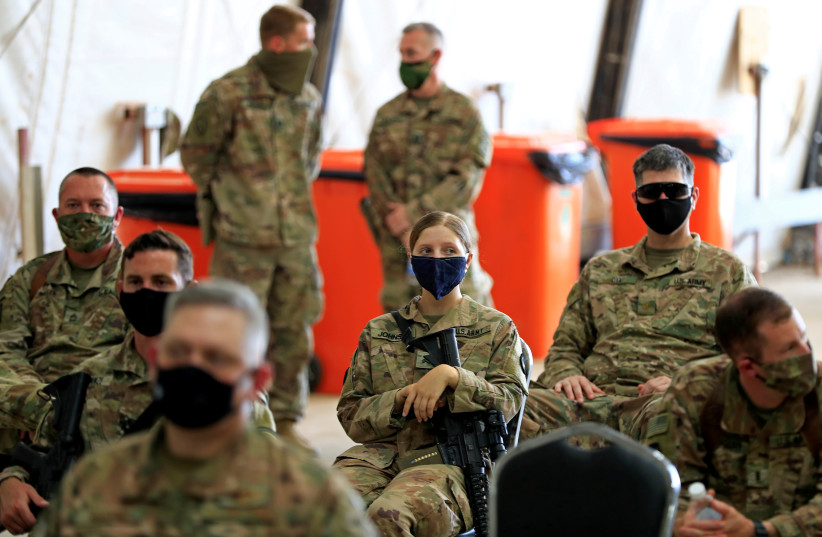Four Israeli teenagers who lost parents serving in the IDF flew to Washington earlier this month for the first time to meet with American teens who also lost a parent while in military service.
The week-long trip to Washington, which took place in early June, was the first trip held by IDF Widows and Orphans organization (IDFWO) for teenagers.
The delegation of teenagers 15-18 years old visited the Pentagon and met with Chairman of the Joint Chiefs of Staff Gen. Mark Milley and other senior military officers. They also visited the Israeli Embassy and met with Ambassador Mike Herzog and IDF military attaché Maj.-Gen. Hidai Zilberman and learned about the connection between the two militaries.
The delegation also took part in a camp designated for US Army orphans by the American T.A.P.S. (Tragedy Assistance Program for Survivors) organization.
Tami Shelach, chair of the IDF Widows and Orphans Organization, said that the organization is a “safe haven” for those who have lost a parent while in the military.
“This delegation is an opportunity to meet a group of their peers – sometimes for the first time in their lives. They meet women and children who are able to understand them like no one else can,” she said.
“The cooperation with our parallel organization in the United States is truly a human embrace between human beings who insist on finding the light at the end of the dark tunnel that has been forced upon them.”

Shai Sheffer, 15, lost his father, Avior Sheffer, when Shai was only five years old. His father, a helicopter navigator, succumbed to cancer in 2009.
“Going to the United States was incredible and I learned so much about loss,” Sheffer told The Jerusalem Post following the visit. “I met so many people and I was able to learn about how different it is to mourn in the US compared to in Israel.”
Ben Voelke was six-years-old when he lost his father, Maj. Paul C. Voelke, while he was serving in Afghanistan in 2012. He’s been involved with T.A.P.S since then.
Sheffer explained that the delegation knew each other beforehand, having gone to several Otzma “Strength” camps held by IDFWO four times a year during the holidays of Sukkot, Hanukkah, Passover and summer break for IDF orphans ages six-18.
“I met so many people and I was able to learn about how different it is to mourn in the US compared to in Israel.”
Shai Sheffer
According to the organization’s website, not only do the camps provide the youths with environments where they can overcome loss and tragedy alongside others who have similar stories, “the camps provide children with four to five fun-filled days, and give their mothers, the widows, a well-deserved break, knowing that their children are happy and thriving.”
Sheffer has been going to the camps since he was eight years old and said that they “really help” him with dealing with the loss of his father.
“These camps have people who really understand what I went through. It’s something special that you can’t find anywhere else.”
The 16-year-old told the Post that he went on a mission with T.A.P.S to Israel where he met Israeli teens who had also lost a parent while serving.
“We really connected and understood that we shared a similar experience,” he said by phone.
When the Israelis came to Washington, “it was very special. Someone in a different culture and country was going through the same experiences and we can connect on a level that no one can understand.”
Voelke, who is Jewish, explained that during his visit to Israel and during the delegation’s trip to Washington, the teens were able to learn about new things including how to cope with grief.
“Israeli grief is more remembrance which celebrates these people and the contribution they made, while American grief is not moving on but remembering the things they did on a personal level. And we formed a symbiotic grief experience,” he said.
The visit to Washington “was really exciting,” Sheffer agreed. “It was great to go and speak about my loss and to hear about it from American teenagers. It was incredible because we spoke to other orphans and we shared our stories.”
According to him, the delegation not only helped him share his story but taught him coping skills for the future, including how to deal with loss in new ways.
Voelke would like to join the military and serve his country like his father did.
“I would like to follow in his steps and be a military officer in the infantry as he was,” he said, adding that while “it’s a possibility to serve in the IDF,” he would rather serve in the US military.
When asked about drafting into the Israeli military, Sheffer said he wanted to follow in his father’s footsteps and join the air force.
“It’s my dream,” he said.
